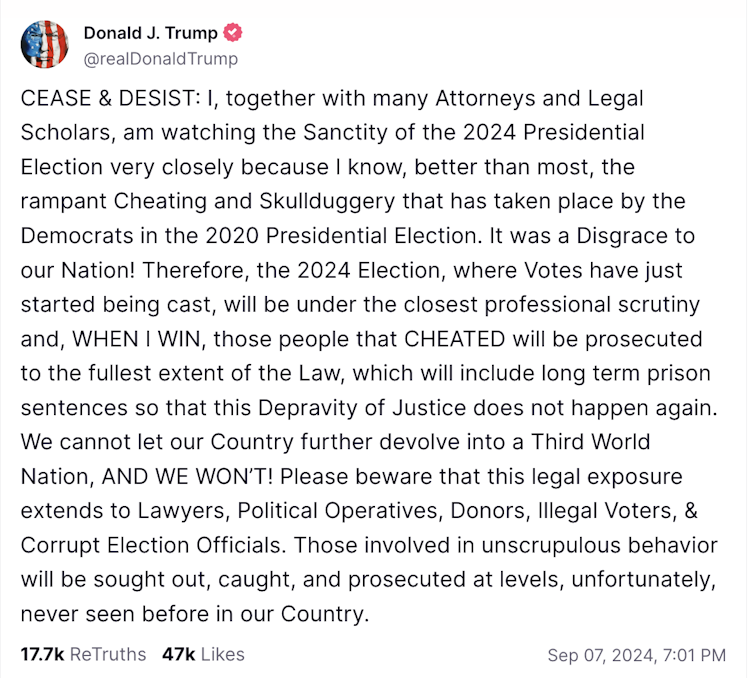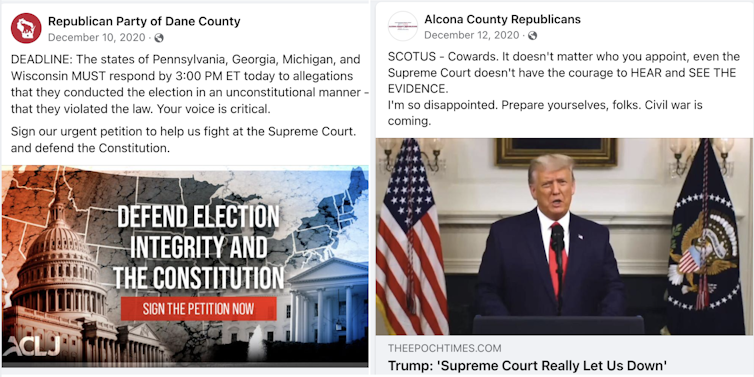Swing-state GOP leaders amplified election denial in 2020 − and may do so again
By Sadie Dempsey, University of Wisconsin-Madison; Benny Witkovsky, University of Wisconsin-Madison; Jianing Li, Rutgers University; Michael W. Wagner, University of Wisconsin-Madison, and Yiming Wang, University of Wisconsin-Madison
With the 2024 election just weeks away, former President Donald Trump continues to spread false claims of fraud in the 2020 election. He also insists without evidence that the same may happen this year.
In a Sept. 7, 2024, post on Truth Social, Trump, the Republican presidential nominee, repeated the claims he has made over the past four years.
“I know, better than most, the rampant Cheating and Skullduggery that has taken place by the Democrats in the 2020 Presidential Election. It was a Disgrace to our Nation! Therefore, the 2024 Election, where Votes have just started being cast, will be under the closest professional scrutiny and WHEN I WIN, those people that CHEATED will be prosecuted to the fullest extent of the Law, which will include long term prison sentences so that this Depravity of Justice does not happen again.”
Trump’s rhetoric bears the hallmarks of the 2020 #StopTheSteal movement: preemptively challenge votes before they are cast, strategically target the most closely contested places, and present election denial as a patriotic duty in response to a grave injustice.
As scholars of political communication, we mapped election fraud claims as they spread across electoral battlegrounds in 2020 and built toward the violence at the United States Capitol on Jan. 6, 2021. We did this to better understand how a myth could embed itself in the minds of thousands of people across the country, encouraging them toward increasingly extreme action.
Our analysis, published in Politics & Society, revealed patterns that are critical to understanding the upcoming 2024 election.
Those patterns showed that the seeds of election denial were planted early, with spikes during spring elections as early as April 2020. Local claims were spread across the country by politicians and media figures, and small claims of misconduct escalated into larger calls for dramatic action. We believe they risk being repeated.
It appears from Trump’s statements that he and his campaign are ready to repeat the claims of misconduct they spread in 2020 and long after.
Will local Republican Parties serve again as their megaphone?
A social media post from Donald Trump, predicting he will win the 2024 election and that he will then prosecute those whom he claims cheated in the 2020 election.
Screenshot, Truth Social, Donald J. Trump post
Local fraud claims
The past few years have seen significant debate about whether and how to hold Trump, his advisers and the people who stormed the Capitol on Jan. 6, 2021, accountable for their actions.
The organizational infrastructure that supported the #StopTheSteal movement remains largely intact. People who amplified election fraud claims remain in charge of national and local parties. And there have even been concerted efforts to put allies of this movement in charge of election administration in key places.
This movement was not built only from the top down in the White House or Mar-a-Lago. We found that hundreds of local county political party organizations amplified claims that called the 2020 election into question.
According to our analysis of 410 county Republican Parties’ behavior on Facebook from January 2020 to January 2021, these parties and their members questioned the election’s legitimacy through almost 5,000 posts to an audience of more than half a million followers. These posts began in the spring of 2020, with steep increases in the weeks immediately before and following Election Day.
Some posts were tepid, questioning the existence of “funny numbers” in Michigan or “irregularities” in Wisconsin. Others were more extreme, calling followers to “fight” to “defend the Constitution” or warning that “civil war is coming.” Facebook and its conservative bias that drives higher engagement with right wing content makes it a crucial vehicle for spreading conspiracy theories like these.
Sometimes, local GOP organizations served as a megaphone for Trump and his allies, echoing their claims of fraud to a local audience. These organizations often created their own content, however, giving this national campaign a sense of local urgency.
For example, the Cobb County Republican Party in Georgia amplified false claims made by what they called a local “whistleblower” that Cobb County ballots had been “shredded.”
This claim became part of the national story of election fraud. In fact, Trump referenced these claims of ballot shredding in his infamous phone call with Georgia Secretary of State Brad Raffensperger, when Trump pressured him to “find 11,780 votes.”
Other false claims of election fraud first surfaced at the local level but were amplified nationally as well. False claims included the alleged “lost” flash drive in Milwaukee, Wisconsin, the alleged “17,000 duplicate votes” in Arizona’s Maricopa County and the alleged “20,000 dead people” who voted in Pennsylvania.
Many of these false claims became part of a national narrative of election fraud. They illustrate the crucial role that local claims of fraud, amplified by local party leaders, played in the national struggle to overturn the 2020 election.
Not only did these local party leaders play a role in crafting the story of election fraud, they rallied and transported some of the foot soldiers of Jan. 6. Only a fraction of the thousands of people who heard Trump give a speech on the Ellipse marched to the Capitol; an even smaller group breached its walls. But several local party officials were among the more than 1,200 people charged with crimes at the Capitol that day.
The rhetoric we saw deployed and amplified from local parties, we argue, helped give permission for this action. County party leaders in North Carolina urged their followers to do “something historic” and join “Trump’s Army … on the March to DC.” Other county parties chartered buses or supported caravans to transport their followers to the National Mall that day.
Screenshots of two December 2020 Facebook posts, from the Republican Party of Dane County, Wisconsin, on the left, and the Alcona County Republicans from Michigan on the right.
From rhetoric to action
In recent years, the presidential political map has become more predictable. Before voting for president starts, candidates and parties know which states, counties and even precincts are likely to be the most competitive and consequential.
This predictability provides a useful road map for those who would challenge the legitimacy of an election. In 2020, claims of election fraud from Trump and his supporters followed the political map where efforts might be most likely to tip the balance. Their efforts focused on counties with growing Trump support in states where Trump narrowly lost, such as Georgia and Wisconsin.
The #StopTheSteal movement has had four years to study and even attempt to influence and gain control of election processes in the most politically consequential places. It appears that Trump and his allies are gearing up for a similar strategy in 2024, once again putting state and county elections and political institutions in the national spotlight.
But 2024 is not 2020. Americans can anticipate and work to counter the same escalation from claims of fraud, which have already begun, that could end in violence directed at political institutions and lack of confidence in the election outcome.
In the weeks leading up to the election, there are warning signs to watch for.
Are local organizations echoing the claims of fraud made by national leaders? Are they targeting specific jurisdictions before any votes are cast? And are they trying to convince supporters that challenging the election is their moral and civic duty? Are they targeting election administration professionals who are charged with counting the votes?
These are the factors that can turn heated political rhetoric into something more menacing.![]()
Sadie Dempsey, Ph.D. Candidate in Sociology, University of Wisconsin-Madison; Benny Witkovsky, PhD Candidate in Sociology, University of Wisconsin-Madison; Jianing Li, Assistant Professor of Communication, School of Communication and Information, Rutgers University; Michael W. Wagner, William T. Evjue Distinguished Chair for the Wisconsin Idea & Professor of Journalism and Mass Communication, University of Wisconsin-Madison, and Yiming Wang, PhD candidate, University of Wisconsin-Madison
This article is republished from The Conversation under a Creative Commons license. Read the original article.




